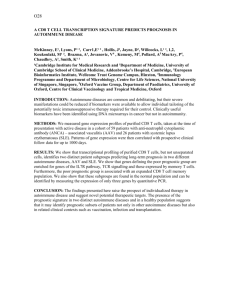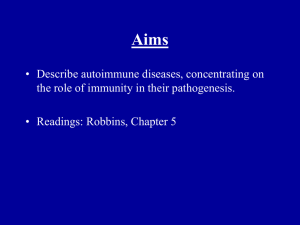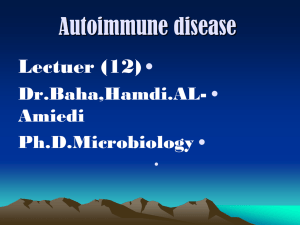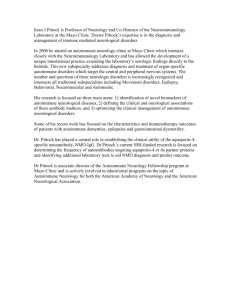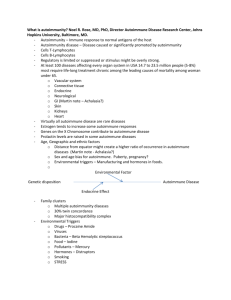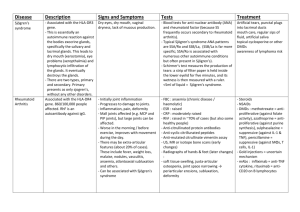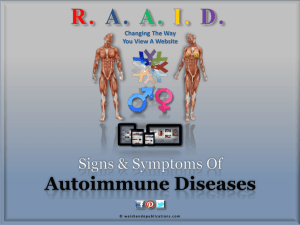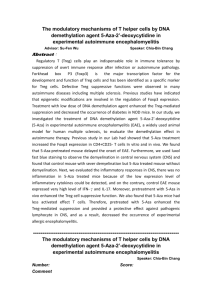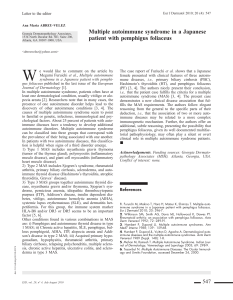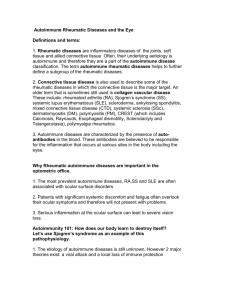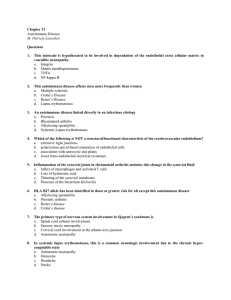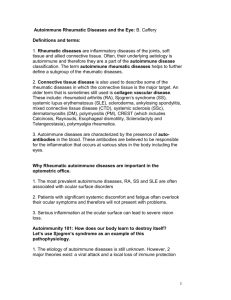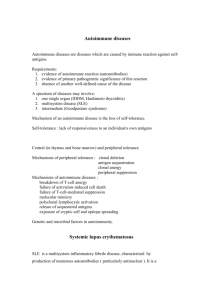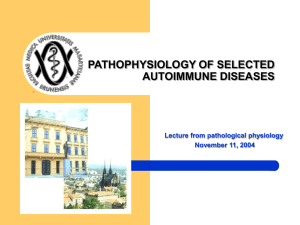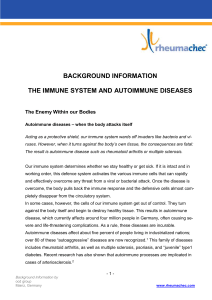Immune System Disorders Student Made Fill In
advertisement
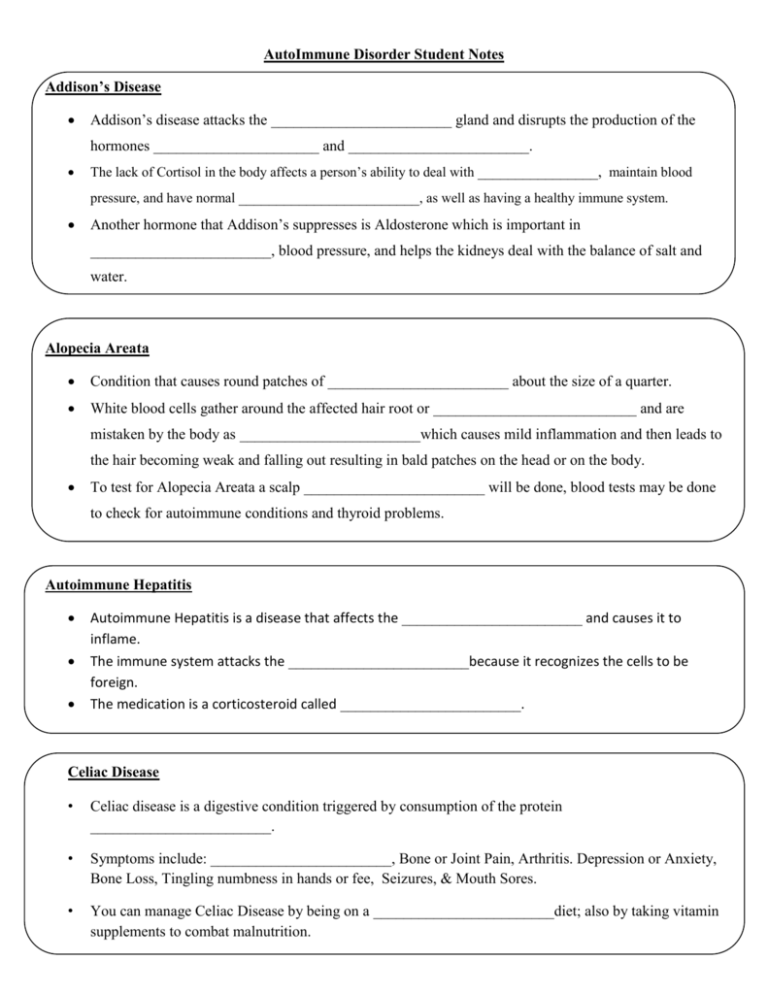
AutoImmune Disorder Student Notes Addison’s Disease Addison’s disease attacks the ________________________ gland and disrupts the production of the hormones ______________________ and ________________________. The lack of Cortisol in the body affects a person’s ability to deal with ________________, maintain blood pressure, and have normal ________________________, as well as having a healthy immune system. Another hormone that Addison’s suppresses is Aldosterone which is important in ________________________, blood pressure, and helps the kidneys deal with the balance of salt and water. Alopecia Areata Condition that causes round patches of ________________________ about the size of a quarter. White blood cells gather around the affected hair root or ___________________________ and are mistaken by the body as ________________________which causes mild inflammation and then leads to the hair becoming weak and falling out resulting in bald patches on the head or on the body. To test for Alopecia Areata a scalp ________________________ will be done, blood tests may be done to check for autoimmune conditions and thyroid problems. Autoimmune Hepatitis Autoimmune Hepatitis is a disease that affects the ________________________ and causes it to inflame. The immune system attacks the ________________________because it recognizes the cells to be foreign. The medication is a corticosteroid called ________________________. Celiac Disease • Celiac disease is a digestive condition triggered by consumption of the protein ________________________. • Symptoms include: ________________________, Bone or Joint Pain, Arthritis. Depression or Anxiety, Bone Loss, Tingling numbness in hands or fee, Seizures, & Mouth Sores. • You can manage Celiac Disease by being on a ________________________diet; also by taking vitamin supplements to combat malnutrition. Crohns Disease a chronic disorder of unknown origin characterized by inflammation of the ________________________ (GI) tract. it might be a ________________________, something in the intestines, or even family history, and scientists now believe it is a combination of all these factors. Crohn’s disease can affect anyone at any age; however, it's usually first diagnosed in people in their __________ and twenties. Goodpasture’s Syndrome is a rare autoimmune disease that affects both the The disease occurs when the body's immune system mistakenly produces ___________________ against _________ and the ______________ ____________________ in the lungs and kidneys. The first signs of Goodpasture’s syndrome may include: _________________________, Nausea and __________________, ___________________ breathing, & _____________________ skin Graves Disease Graves disease is an autoimmune disorder that is from the ________________________of the ________________________ gland. Three symptoms of Graves disease are: ________________________ heart rate, sleeping difficulty, & swelling of the ________________________.. Some treatment options for Graves Disease are: ________________________,anti-thyroid medication , & surgery. Lupus 1. Chronic ________________________ and body damage. 2. Not infectious or ________________________. 3. Most common symptom: ________________________ rash on cheeks and nose. . Mellitus Mellitus is an inflammatory autoimmune disease of the ________________________, resulting in a lack of ________________________. The glucose level in blood ________________________and cells do not have enough energy for metabolism. The lack of insulin leads to increased ________________________________________ glucose! Multiple Sclerosis • affects the brain and spinal cord; It damages the ________________________ and slows down messages between the brain and the body. • Symptoms of Multiple Sclerosis include ________________________ problems, coordination, numbness, and even spasticity paralysis. • There is no cure for Multiple Sclerosis but ________________________ and _____________________ therapy are available as well as plasma exchange and medications are ways of treating MS. Polymyalgia Rheumatica The name Polymyalgia Rheumatica literally means __________________________________________. ______________ typically affects adults over the age of 50. Doctors may treat PMR by giving a low dose of ________________________. Rheumatic Fever • • • • Rheumatic fever is an autoimmune inflammatory disease that occurs when strep throat and scarlet fever isn’t treated Causes body tissues to swell Can lead to the scarring of heart valves, making it harder for the heart to pump blood Affects the joints, heart, skin, and brain Rheumatoid Arthritis Rheumatoid Arthritis is a chronic disease that occurs in j________________________of both sides of the body. Rheumatoid Arthritis causes your immune system to attack the synovium, resulting in inflammation. Long-term symptoms ________________________and disability of the joints. Rheumatoid nodules (lumps of tissue) may also form under the skin. Scleroderma Scleroderma affects the body by _________________ and tightening the skin and the connective tissue. When cells make ___________________________ to repair an injury, too much is produced. The skin tightens, causing the hands to swell and the fingers become white from ___________ blood circulation. Sjogren’s Syndrome A chronic disorder in which the white blood cells attack the ________________________and tear ________________________. There is no known ____________________ to having Sjögren’s Syndrome. However there are very few contributing factors such as ; viral infections, heredity, hormones. Because it is ___________________, there is no particular way to prevent developing the disease. Wegeners Granulomatosis Wegeners Granulomatosis is an uncommon of your blood vessels that causes inflammation of the persons blood vessels, which restricts blood flow to various organs. The most common body orientations that are affected are the kidneys, lungs, and upper respiratory tract. Besides having inflamed blood vessels, Wegener's Granulomatosis produces a type of inflammatory tissue known as a granuloma, which is found around the blood vessels


